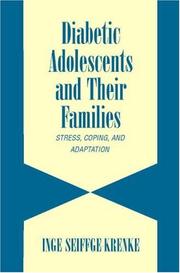| Listing 1 - 10 of 19 | << page >> |
Sort by
|
Book
ISBN: 0805812350 Year: 1995 Publisher: Mahwah, N.J. : Lawrence Erlbaum Associates,
Abstract | Keywords | Export | Availability | Bookmark
 Loading...
Loading...Choose an application
- Reference Manager
- EndNote
- RefWorks (Direct export to RefWorks)
Stress in adolescence --- Adjustment (Psychology) in adolescence --- Interpersonal relations in adolescence --- Stress chez l'adolescent --- Ajustement chez l'adolescent --- Relations humaines chez l'adolescent --- Adjustment (Psychology) in adolescence. --- Interpersonal relations in adolescence. --- Stress in adolescence. --- Ontwikkelingspsychologie --- pubertijd en adolescentie --- Stress (Physiology) in adolescence --- Stress (Psychology) in adolescence --- Stress in teenagers --- Adolescent psychology --- Teenagers --- Physiology --- pubertijd en adolescentie. --- Pubertijd en adolescentie.

ISBN: 9780511500022 9780521792004 9780521310000 0511500025 0511017057 9780511017056 0511031688 9780511031687 0511175159 9780511175152 0521792002 0521792002 9780511155307 0511155301 0521310008 1107121752 9786610430130 0511302479 1280430133 0511046952 9781107121751 6610430136 9780511302473 9781280430138 9780511046957 Year: 2001 Publisher: Cambridge ; New York : Cambridge University Press,
Abstract | Keywords | Export | Availability | Bookmark
 Loading...
Loading...Choose an application
- Reference Manager
- EndNote
- RefWorks (Direct export to RefWorks)
Diabetic Adolescents and their Families presents an innovative approach to the study of coping with chronic illness by focusing on the developmental context in its description of a longitudinal study of families with a diabetic or a healthy adolescent. Inge Seiffge-Krenke considers perspectives of the ill adolescents, their parents, and the physicians treating them. Highlighted topics include typical stressors, individual and family coping strategies, and psychosocial consequences associated with diabetes. The author also examines the changes that occur in adolescents' self-concept and body image and analyses their relationships with parents, physicians, friends, and romantic partners as sources of support and of stress. Numerous case studies illustrate the difficulty of balancing normative development and adherence to the therapeutic regimen. Integrating clinical concerns with fundamental findings of developmental psychology, this book will be of value to anyone with an interest in the study of adolescent health psychology.
Diabetes in adolescence. --- Diabetics --- Diabetes in adolescence --- Diabetes in teenagers --- Juvenile diabetes --- Teenagers --- Diabetes --- Chronically ill --- Family relationships. --- Psychological aspects. --- Diseases --- Patients --- Health Sciences --- Psychiatry & Psychology
Book
ISBN: 3456800126 Year: 1974 Publisher: Bern : Huber,
Abstract | Keywords | Export | Availability | Bookmark
 Loading...
Loading...Choose an application
- Reference Manager
- EndNote
- RefWorks (Direct export to RefWorks)
Book
Publisher: Vandenhoeck & Ruprecht
Abstract | Keywords | Export | Availability | Bookmark
 Loading...
Loading...Choose an application
- Reference Manager
- EndNote
- RefWorks (Direct export to RefWorks)
Book
ISBN: 3662479958 Year: 2016 Publisher: Berlin, Heidelberg : Springer Berlin Heidelberg : Imprint: Springer,
Abstract | Keywords | Export | Availability | Bookmark
 Loading...
Loading...Choose an application
- Reference Manager
- EndNote
- RefWorks (Direct export to RefWorks)
Dieses Buch beleuchtet, wie sich die Rolle von Vätern, ihre Beziehung zum Kind und zur Partnerin verändert haben, wie sich Väter in unterschiedlichen familiären und kulturellen Kontexten fühlen und verhalten und welche Konsequenzen sich daraus für Therapie und Beratung bei Kindern und Jugendlichen sowie ihren Eltern ergeben. Geschrieben für Kinder- und Jugendlichenpsychotherapeuten, Psychologische Psychotherapeuten in Klinik und Praxis, Schulberater, Pädagogen, Sozialpädagogen, Mitarbeiter in Erziehungsberatungsstellen, Familientherapeuten. Aus dem Inhalt Defizite der bisherigen Vaterforschung – Vaterschaft im Wandel und verschiedene Vatertypen – Die Akzentuierung des Geschlechts: Väter und Söhne, Väter und Töchter – Vater und Mutter im Vergleich, homosexuelle Väter: Warum sind Differenzerfahrungen wichtig? – Sind frischgebackene Väter „in der Krise“? – Abwesende Väter durch Scheidung und Trennung – Alleinerziehende Väter – Der Tod des Vaters – Kulturelle Einflüsse auf die Vaterschaft – Väter und Psychopathologie. Die Autorin Prof. Dr. Inge Seiffge-Krenke, Professorin für Entwicklungspsychologie an der Universität Mainz, ist Psychoanalytikerin, in der Ausbildung von Kinder- und Jugendlichen- sowie Erwachsenentherapeuten aktiv und Sprecherin der Arbeitsgruppe der Konfliktachse der OPD-KJ. Als Jugendforscherin untersuchte sie Stressoren und Bewältigungsformen von Jugendlichen in verschiedenen Ländern. Aktuell forscht sie verstärkt zu Beruf, Partnerschaft, Eltern-Kind-Beziehung, Vaterschaft und Identität.
Psychotherapy . --- Developmental psychology. --- Child psychology. --- School psychology. --- Psychotherapy. --- Counseling. --- Pediatrics. --- Social groups. --- Family. --- Developmental Psychology. --- Child and School Psychology. --- Psychotherapy and Counseling. --- Sociology of Family, Youth and Aging.
Book
ISBN: 128195506X 9786611955069 3540683003 Year: 2009 Publisher: Berlin : Springer-Verlag,
Abstract | Keywords | Export | Availability | Bookmark
 Loading...
Loading...Choose an application
- Reference Manager
- EndNote
- RefWorks (Direct export to RefWorks)
Perspektiven aus Entwicklungspsychologie und Psychotherapie integrieren Trotz der offenkundigen Berührungspunkte zwischen Entwicklungspsychologie und Psychotherapie, führten beide Disziplinen lange Zeit ein Dasein als "feindliche Schwestern". Dabei sind bestimmte pathologische Veränderungen erst mit entwicklungspsychologischen Kenntnissen verständlich. Aber auch die Entwicklungspsychologie profitiert von den Erkenntnissen psychotherapeutischer Behandlung und gelangt so zu einem besseren Verständnis von Entwicklungsprozessen. Aus dem Inhalt: Bindungsentwicklung Familiäre Entwicklungsprozesse im Beziehungskontext Väter – notwendig, überflüssig oder sogar schädlich für die Entwicklung ihrer Kinder? Geschwisterbeziehung zwischen Verbundenheit und Individuation Dieses Buch trägt zur Integration der Entwicklungspsychologie und Psychotherapie – speziell der analytischen bzw. tiefenpsychologischen Psychotherapie – bei. So profitieren beide Disziplinen.
Psychotherapy . --- Psychiatry. --- Psychoanalysis. --- Developmental psychology. --- Psychotherapy. --- Developmental Psychology.
Book
Year: 1993 Publisher: London Academic press
Abstract | Keywords | Export | Availability | Bookmark
 Loading...
Loading...Choose an application
- Reference Manager
- EndNote
- RefWorks (Direct export to RefWorks)

ISBN: 0805818391 Year: 1998 Publisher: Hillsdale Erlbaum
Abstract | Keywords | Export | Availability | Bookmark
 Loading...
Loading...Choose an application
- Reference Manager
- EndNote
- RefWorks (Direct export to RefWorks)
Health behavior in adolescence --- Teenagers --- Health and hygiene
Book
ISBN: 3590143762 3590143770 Year: 1981 Publisher: Dusseldorf Schwann
Abstract | Keywords | Export | Availability | Bookmark
 Loading...
Loading...Choose an application
- Reference Manager
- EndNote
- RefWorks (Direct export to RefWorks)

ISBN: 0415117917 0415117925 Year: 1997 Publisher: London Routledge
Abstract | Keywords | Export | Availability | Bookmark
 Loading...
Loading...Choose an application
- Reference Manager
- EndNote
- RefWorks (Direct export to RefWorks)
Parent and teenager --- Father and child --- Adolescence --- Adolescent psychology --- Fathers --- Parents et adolescents --- Père et enfant --- Adolescents --- Pères --- Psychologie --- Adolescence. --- Adolescent psychology. --- Father and child. --- Fathers. --- Parent and teenager. --- Ontwikkelingspsychologie --- pubertijd en adolescentie --- pubertijd en adolescentie. --- Pubertijd en adolescentie. --- Père et enfant --- Pères --- Parent-teenager relations --- Parenting of teenagers --- Parents and teenagers --- Teenager and parent --- Teenagers and parents --- Dads --- Child and father --- Father-child relationship --- Fathers and children --- Teenagers --- Teen-age --- Psychology --- Development --- Parent and child --- Men --- Parents --- Househusbands --- Puberty
| Listing 1 - 10 of 19 | << page >> |
Sort by
|

 Search
Search Feedback
Feedback About UniCat
About UniCat  Help
Help News
News